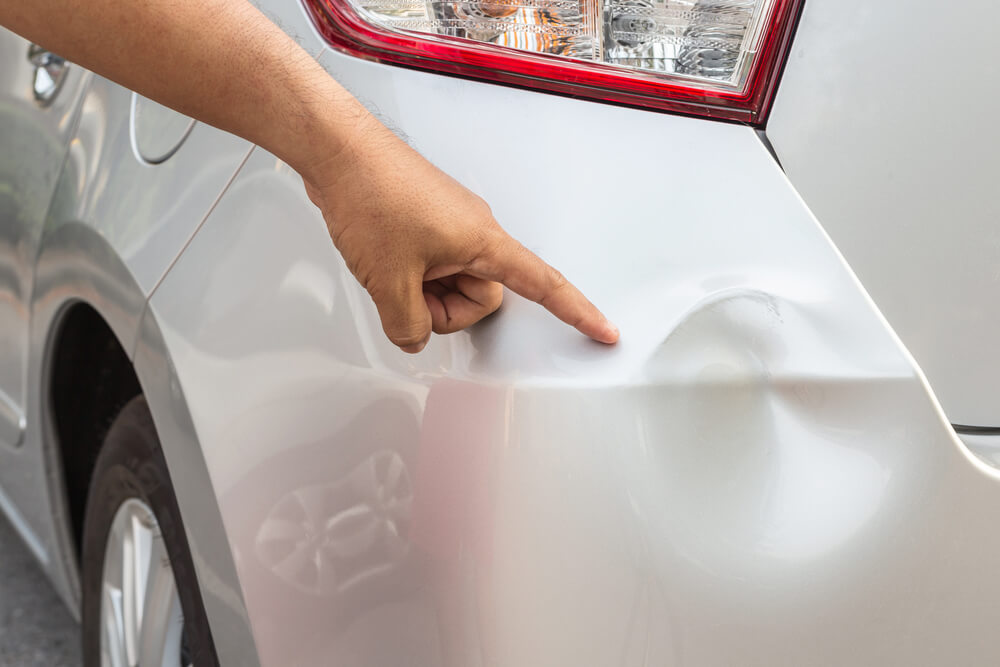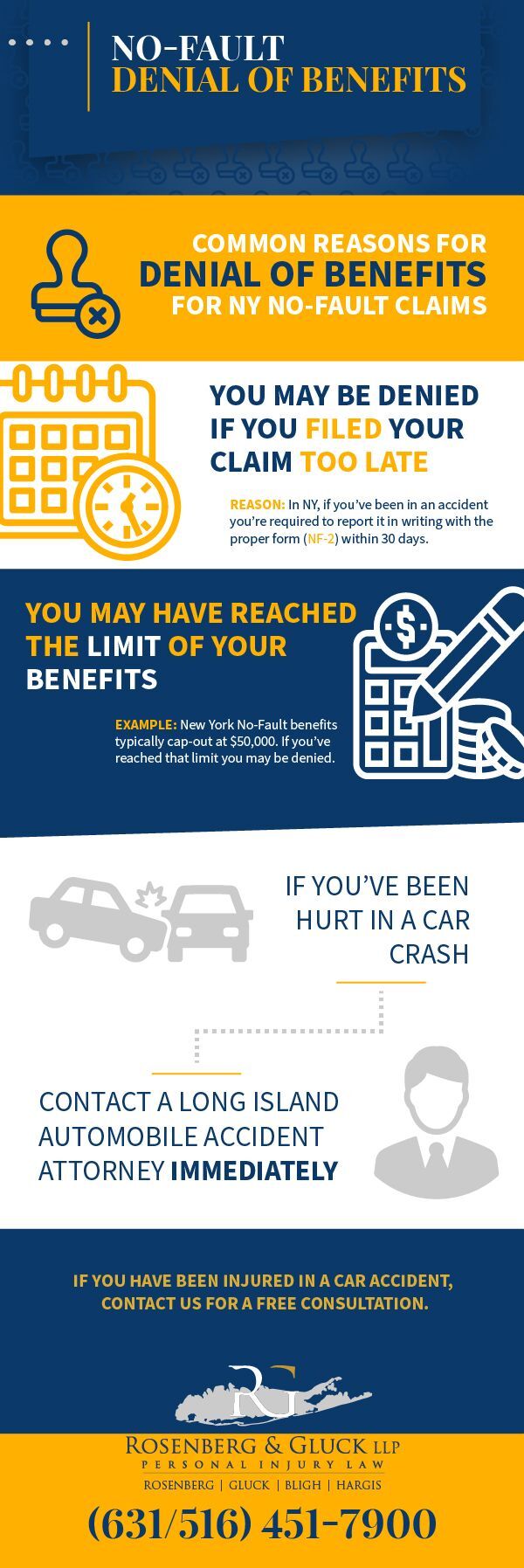
Sometimes, insurance companies will find excuses to refuse to pay for some or all of the benefits a claimant deserves. When they deny insurance coverage, they leave victims frustrated and confused about what to do next. Luckily, you can challenge a denial of no-fault benefits.
In the four previous parts of this series, we discussed how no-fault benefits work. In this blog, we will address the worst-case scenario after a crash: denial of your no-fault benefits.
Work with a legal team that understand no-fault insurance claims and knows how to fight for the be benefits you deserve after a crash. An experienced car accident lawyer can assess your options and pursue the best possible outcome in your case. Most law firms provide free initial consultations for prospective clients, so discuss your next steps with a car accident lawyer for free today.
How Does Denial of Benefits Happen?
Unfortunately, insurance companies are not on the side of claimants. Adjusters do not work for policyholders or those seeking compensation. Whether a claimant files a no-fault or third-party liability claim, the insurance adjuster almost always takes their company’s side. They want to spend as little money as possible to close the claim.
An adjuster could wrongfully deny claims or look for reasons to refuse to pay you, so crash victims should always speak with an attorney as early in the claims process as possible.
So, what excuses could the insurance company use to deny a claim?
- You filed the claim too late
- You reached the policy limit
- You missed an appointment they set
- Their doctor says you do not need the care
While all of these could provide valid reasons to deny a claim, there’s often more to the story. Let’s look at each one individually.
You Filed the Claim Too Late
Getting medical care immediately when you have significant crash injuries is the highest priority. However, you also need to file your claim as soon as your injuries allow. You often only have up to 30 days to file a claim and notify the insurance company of your bills and missed income. If you miss this deadline, they could deny your claim.
You Reached the Policy Limit
No-fault insurance policies often have relatively low limits New York policies generally top out at $50,000. If you require a hospital stay or surgery, you could exceed this limit quickly.
If you previously submitted bills and have additional payments for ongoing care, the insurer could deny coverage for some of them because your payouts exceed the policy limits.
In some states, this shortage allows you to pursue a fault-based claim or lawsuit and seek compensation for the remainder of your damages. If this applies to you, speak with an attorney as soon as possible. Other options may allow you to seek additional damages.
You Missed an Appointment
Often, no-fault insurance carriers ask claimants to attend appointments to verify their injuries.
They typically do this in one of two ways:
- Independent medical examinations (IME)
- Examinations under oath (EUO)
Both options usually require you to appear when and where the insurer asks you to. During an IME, a doctor chosen by the insurer will examine you. During an EUO, they will question you about the crash, your injuries, your treatment, and any previous injuries. If they call you for either of these appointments and you do not show up, they could deny your benefits.
Their Doctor Says You Do Not Need the Care
The other danger of an IME or EUO is that the insurer’s doctor could rule that you are not hurt or do not require further treatment. This is possible even if your treating physician disagrees and prescribes additional care.
Insurers often use the opinions of their doctors to deny claims. If this happens to you, a car accident lawyer can challenge the decision. Call a lawyer today if you need continued care but the insurance company refuses to pay for it.

How Does No-Fault Insurance Coverage Usually Work?
Currently, 12 states require drivers to purchase no-fault auto insurance policies. Commonly called personal injury protection (PIP) policies, this coverage should make it simpler for the policyholder to seek and secure money after a collision. It also greatly reduces the number of collision lawsuits, since not every driver must prove another driver caused the crash to collect compensation.
Instead, in a no-fault claim, the policy should pay any time a crash occurs as long as the policyholder meets the policy’s criteria, such as suffering injuries and filing a timely claim.
No-fault insurance also covers passengers, pedestrians, and cyclists. The driver’s policy covers passengers, while insurance from the vehicle that hit them covers pedestrians and cyclists. In theory, everyone in a collision should have access to a no-fault policy and its basic coverage.
What Does No-Fault Insurance Cover?
No-fault policies generally only cover basic expenses and losses after a crash, such as:
- Medical treatment up to policy limits
- A portion of lost income
- Some related expenses, such as parking at the hospital and traveling to doctor visits
While these policies provide basic compensation for those hurt in a crash, the money does not cover a wide range of related expenses and losses, including pain and suffering.
Options After Your No-Fault Carrier Denies Your Injury Claim
When a policyholder files a no-fault claim and receives a denial or the insurer fails to respond for 30 days or more, you may challenge the decision or inaction. Discuss your options with an attorney to decide what to do next.
You want an attorney with experience, knowledge, and access to legal resources if you need to negotiate with an insurer or go through the courts to settle your case.
What Else Should You Do While Your Attorney Builds Your Case?
During this time, you may need to work with your health insurance provider to pay your medical bills. They should pay if your no-fault policy denies the claim. However, they will want to recoup their money if you receive compensation from your no-fault insurer later.
Do everything possible to follow your doctor’s orders and get the care you need. Make your treatment and recovery a top priority, even if the insurance company’s doctor says that you do not need further care.
When Can I Pursue a Fault-Based Claim?
You might qualify to pursue compensation through an auto liability insurance claim or personal injury lawsuit. These fault-based cases require you to show that the other driver caused the crash and your injuries.
Each state with no-fault insurance laws has its own rules about when a crash victim should pursue a fault-based claim.
Two common triggers for fault-based claims are:
- When the victim suffers serious injuries
- When the victim’s expenses exceed their PIP coverage
Depending on applicable law and the circumstances of the case, many collision victims could qualify to recover fault-based compensation. Catastrophic injuries almost always qualify, but sometimes a broken arm or less-severe injury could suffice. A car accident law firm in your state can assess your options following a crash.
If the firm’s legal team believes they will find enough evidence to support your claim or lawsuit, they may represent you on contingency. In other words, they will not charge you any upfront fees or out-of-pocket costs. You pay their attorney’s fees as a portion of the total money recovered in your case—so you only pay if they win.
Work With an Attorney to Fight for the Compensation You Deserve
Working with a car crash attorney on your case can benefit you in several ways. An attorney can navigate your claim with the no-fault carrier, assess your options for a fault-based case, and pursue the compensation you deserve through a negligence claim or lawsuit.
You can hold a driver liable for causing a collision by:
- Filing an insurance claim
- Filing a personal injury lawsuit
- Pursuing both options concurrently
Showing the At-Fault Driver Acted Negligently
Before an attorney decides how to approach your case, they will gather evidence to show the driver acted negligently.
They must show four legal elements to prove negligence:
- Duty of care
- Breach of duty
- Causation
- Harm
In traffic collisions, the duty of care generally comes from a traffic law. The at-fault driver breaches their duty by violating the law. This breach of duty causes a collision, and the victim suffers injuries and financial damages. Showing each of these elements requires evidence.
Gathering Evidence and Negotiating a Settlement
To gather common evidence in a collision case, an attorney could:
- Review the police report and other official documents
- Gather relevant medical records
- Seek and preserve photos and videos of the crash
- Interview eyewitnesses
- Hire accident reconstruction specialists
- Survey the crash site
- Examine physical evidence
- Consult with experts
- Document all damages
With the right evidence to support their client’s allegations against the accused driver, the attorney can approach the driver’s insurer and demand fair compensation. Doing so often leads to negotiations for a fair settlement agreement. Insurance settlements are how most traffic collision cases end—few go to trial. Instead, the insurance carrier and victim reach an acceptable agreement, the insurer pays, and the case ends.
If the attorney believes you must file suit, they can file the paperwork in the appropriate civil court. This often occurs while the law firm continues to negotiate and fight for fair compensation from the insurance company in question.
Having the experience, knowledge, and resources of a personal injury firm behind you during this means you do not need to navigate settlement negotiations or the legal system alone. Instead, you can focus on your healing and let your attorney deal with everything else.
Connect With a Car Crash Law Firm Near You for a Free Consultation
If you suffered injuries in a crash with default no-fault insurance coverage, that is your first but not always your only option. You could have the right to sue the at-fault driver or pursue compensation through other means. The best way to find out is to consult a car accident lawyer well-versed in cases like yours.
Contact an experienced personal injury attorney in Long Island as soon as your injuries allow. Most Long Island personal injury law firms provide free assessments where you can learn more about your case, the applicable laws in your state, and what to do next. An attorney might offer to handle your claim, challenge the denial, or file a lawsuit for you. You may still have options to pursue compensation after a crash. Let a car accident lawyer manage the entire process for you.








